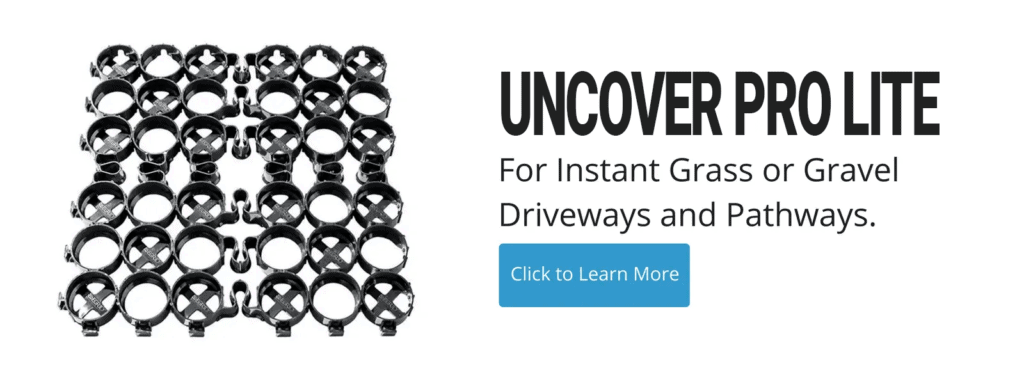The Growing Trend of Parking On Grass Made Simple with TRUEGRID Grass Pavers
Grass parking lots aren’t all that common, but if structured properly, they can serve you just as well as other types of parking lots like asphalt and concrete. In fact, there are thousands of smaller buildings and commercial properties that would benefit greatly from the implementation of parking on grass.

Of course, grass without any support structure won’t last long if used for parking, but with the right paver system, grass can be allowed to thrive and flourish just beneath your parking space, affording you a variety of benefits that asphalt and concrete parking lot owners don’t experience.
It is hard to look professional when you have everyone parking on the grass. Whether you are holding a temporary event or you have a large facility where people are coming to visit you and you don’t have a paved parking lot, there are going to be instances where people have no choice but to park on the grass. There are parking on grass solutions for you to explore.
When you look at parking solutions, you want to make sure that you choose something that is environmentally friendly. Many people think about paving as a way to offer a smooth surface for cars to park on. However, if you think about the environmental effects and how asphalt can be very harmful to the environment.
You will be able to choose the various parking on grass solutions that work effectively based upon your individual circumstances. If you are only using the space temporarily, you want a temporary solution. This means something that you can lay down when it’s time to park and pick up when it’s time to pack up and leave.
Asking people to park on the grass is not always great for business. There are some people who simply don’t want to park on the grass because they don’t feel that it is good for their car. You don’t want people turning away from your business simply because they don’t like where you are asking them to park. By providing a more professional atmosphere as your parking lot, you can generate more customers.
Problems with Parking on Grass
Parking on grass is substantially more eco-friendly than pavement or asphalt, can be more cost-effective, and provides a wonderful natural look that is timeless and welcoming. However, there are some significant drawbacks to parking on grass.
Mud
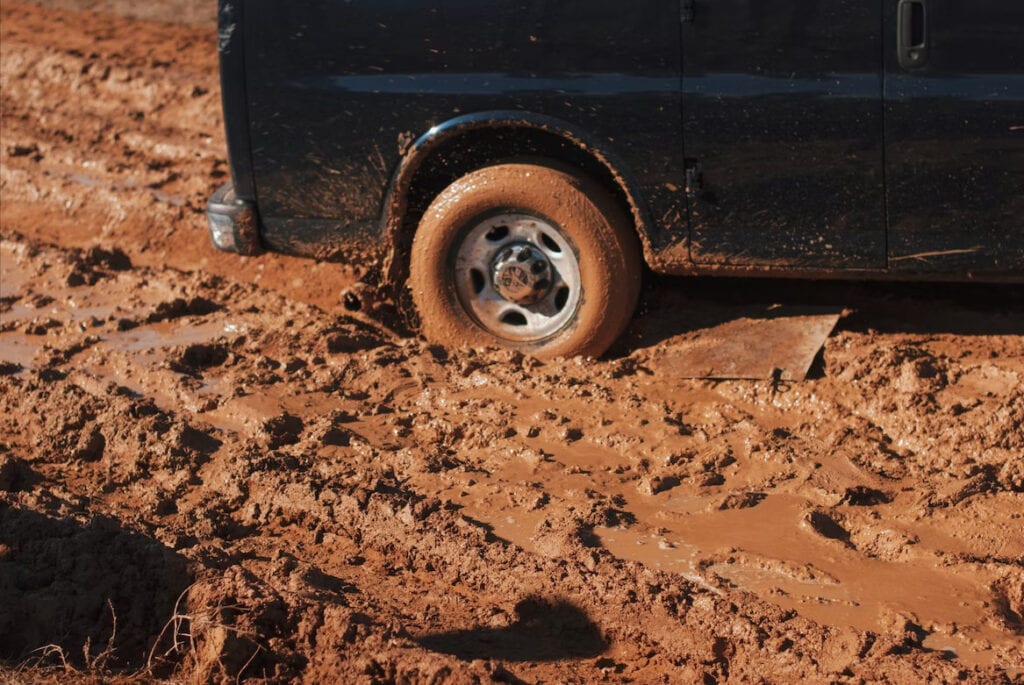
One of the most significant issues with parking on grass is the mud.
Driving on a grass field can become a muddy mess whenever your region receives significant rainfall. As the substantial weight of a vehicle drives across a grassy field, it sinks down into the soil and churns up mud. Mud and rain can rapidly transform your rustically beautiful parking area into a sloppy mud pit.
Mud will soil vehicles and clients, and in the worst scenarios, could result in injury or stuck cars and trucks.
If you reside in a place that experiences snowy winters, spring could transform your beautiful grass parking lot into an uninhabitable mud pit.
Ruts

One of the biggest deterrents from parking on grass is the ruts that can form.
Consistently driving the substantial weight of an automobile across unsupported grass and soil will inevitably eventually cause ruts to develop.
The ruts may be insignificant at first, but they will transform into deep holes, ditches, and trenches, for a difficult and troublesome parking area for typical low-clearance, two-wheel drive cars.
Ruts may form slowly in drier, more arid climates, but they will rapidly become a much larger problem in wet or snowy regions. As cars drive through heavily saturated grass, they rapidly develop massive ruts as the sopping soil is easily pushed around. Once the ruts dry out during the summer, they become cemented in place, and require significant maintenance to repair the damage.
Dead Grass
A major drawback to parking on grass is that the weight of an automobile will easily crush and kill the grass roots with consistent driving.
Because of this, it will not take long for your stunning emerald sea of a parking lot to transform into a dead, yellow, and brown dirt pit.
Parking On Grass Benefits
In case you are looking for car parking on grass solutions and you want to be fully informed on how it can make your life easier, let’s go over the benefits of some parking on grass solutions right now.
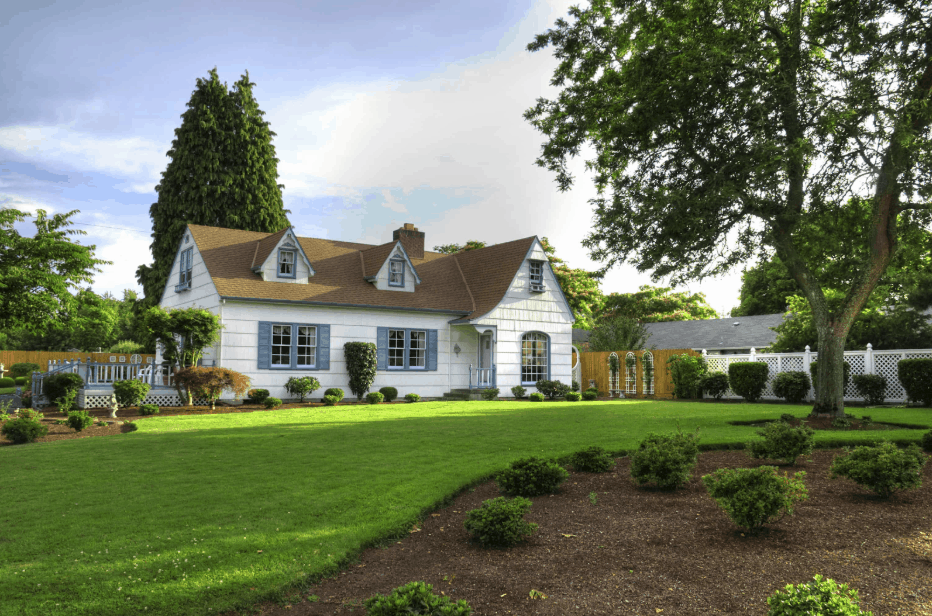
Grass is Cheaper
One of the most obvious benefits of using a grass parking lot is the cost-effectiveness of parking on grass. Instead of tearing up land and paving it over with solid, impervious material like the asphalt and concrete so commonly used in many of today’s parking lots, why not work with the land and allow it to flourish while simultaneously providing parking on grass solutions for yourself and others?
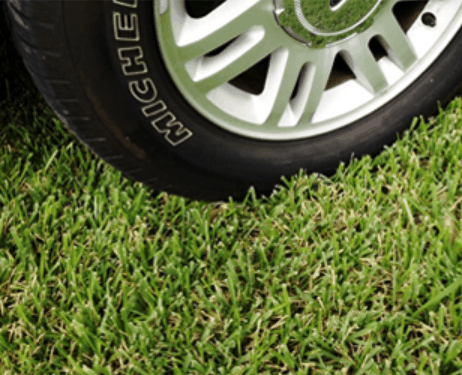
The time and expense to lay an asphalt or concrete parking lot is far greater than that of grass parking, as well as the upkeep. Asphalt and concrete don’t allow stormwater to pass through them, which means you have to spend money on a drainage system for your parking lot and the maintenance that comes along with it as well.
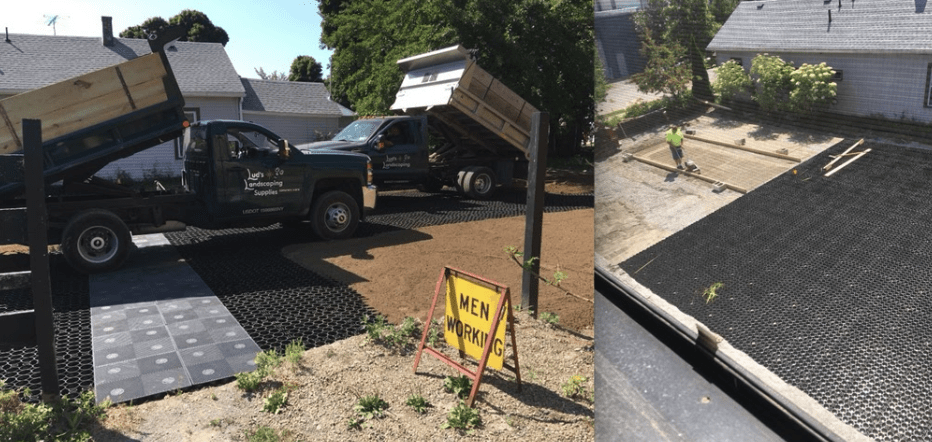
As we see in car parking on grass solutions like TRUEGRID’s permeable pavers, the drainage system is naturally built into the pavers and allows stormwater to pass right through into the ground. This eliminates the need for costly drainage, and one of the only real maintenance costs you’ll have is whatever you spend on the grass to keep it healthy and fresh. The pavers will not interfere with fertilization or watering efforts.
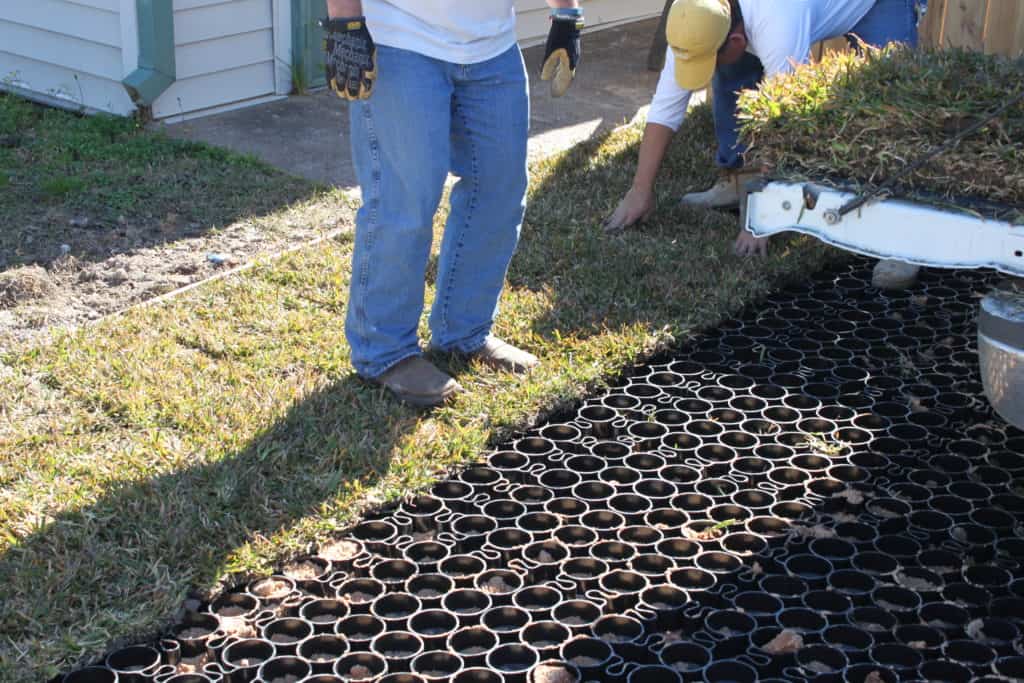
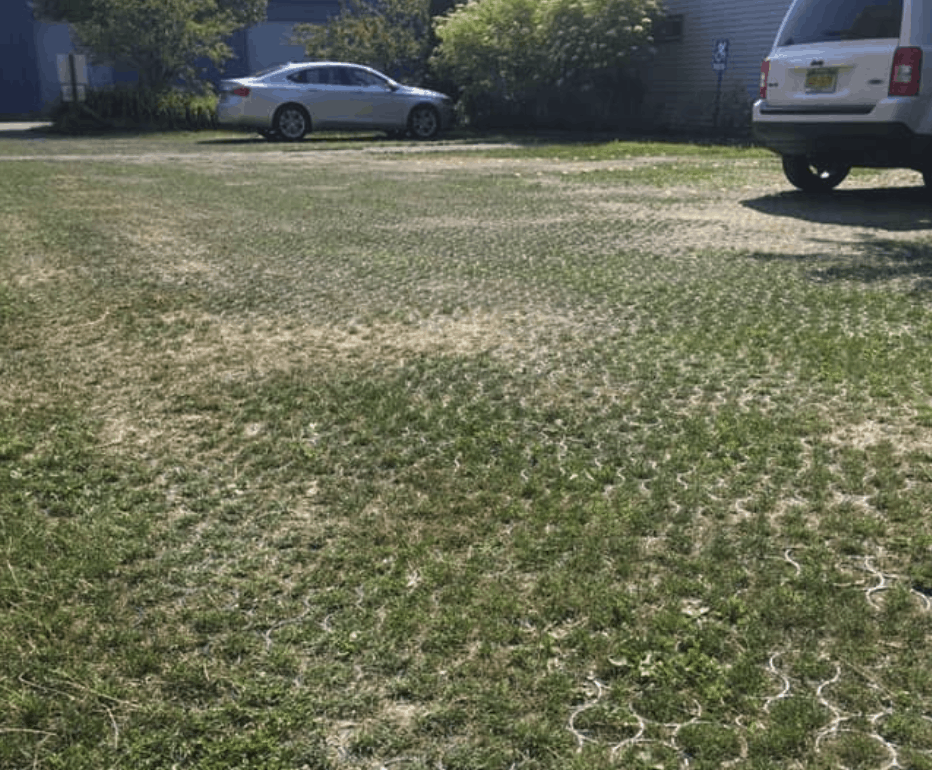
Grass Pavers Give You More Options
Another great benefit of using a grass parking area is that you can use it in a variety of ways, unlike asphalt or concrete. A nice grass firelane next to your office instead of a concrete strip is so much more appealing. You could create a driveway in your yard that’s completely hidden in your lawn. Have an RV or boat and need to park it? A newly minted teenager who has his own ride? You could also use TRUEGRID grass pavers to build some extra parking spots in your yard, a second driveway that leads to a different building on your property like a garage or shed, roadways for off-road vehicles, fire lanes, and more.
Permeable pavers can be used as your on grass parking solution. They will work with any type of land and prevent erosion – thus ensuring that you have maximum use of the ground in which you expect people to park. You don’t have to worry about the overall appearance, either, because it will go flush with the environment. The added benefit is that you don’t have the ongoing maintenance of repaving or reestablishing paint lines.
You also have the option of choosing between natural grass, sod rolls, or artificial turf to use with your grass pavers. For teh least expensive method, flip the TRUEGRID PRO LITE over and press into the existing grass. The grass will qucikly gorw through and you now have stabilized grass parking. To make the grid completely invisible, use the PRO LITE or PRO PLUS with teh cells up, fill the cells with soil and seed , or for a faster process cover with sod. Or even and artificial turf if you you don’t want to mow.You now have a stabilized grass parking surface that can handle cars, RV’s or trucks without rutting or mud.
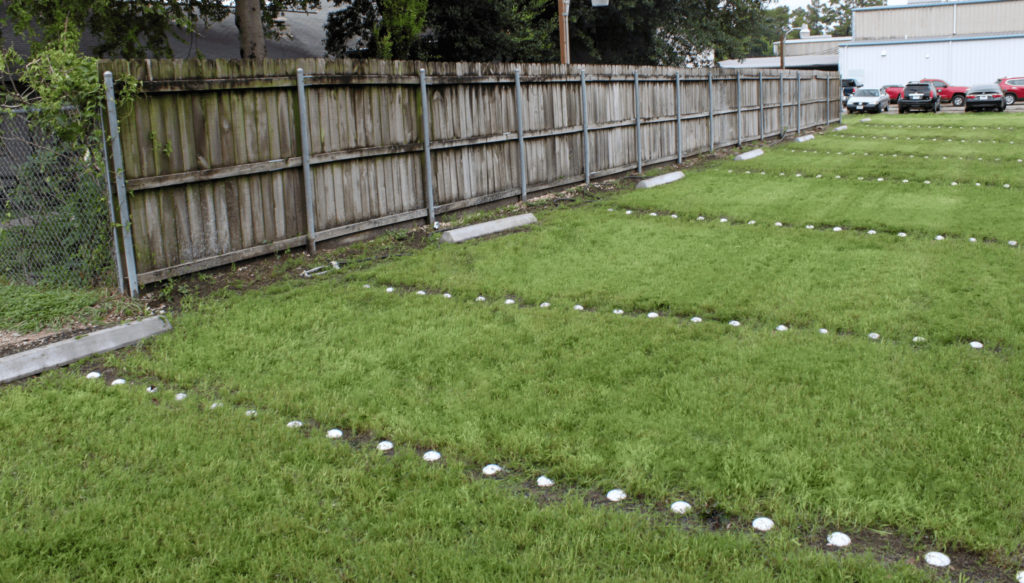
Obstacles, curves, and other obstructions can be easily avoided and planned around by trimming the grass pavers to fit where you need them. This allows you complete versatility to create a parking area of any shape or size you want without breaking the illusion of a natural grass landscape.
Grass Parking Can Hold Its Own
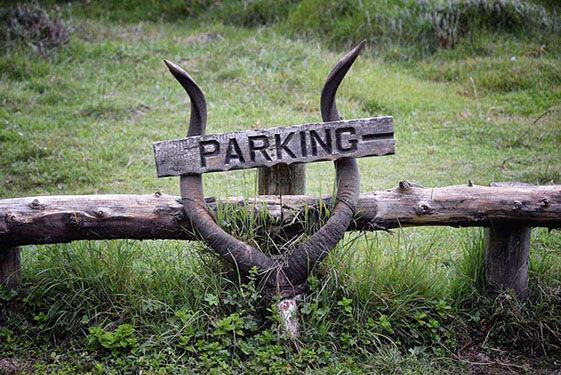
When built with high-quality grass pavers like those from TRUEGRID, grass parking lots prove to be just as, if not more, durable than asphalt or concrete lots. In rural and suburban areas, this can make for equally effective yet much more attractive parking on grass solutions.
However, though they may be effective long-term car parking on grass solutions, grass pavers from TRUEGRID are made with maximum sustainability in mind. From source to installation, and every step along the way, TRUEGRID has taken steps to ensure that maximum sustainability is being achieved.
TRUEGRID paver products use 100% post-consumer recycled plastic in the grids themselves. None of the other parking on grass solutions are nearly as environmentally-friendly as TRUEGRID pavers.
Professional-Looking Solutions for Parking on Grass
Don’t lose hope! While there are a handful of problems with parking on grass, some very suitable, practical options have been developed as solutions.
Open-Pattern Pavers

Open-pattern pavers refer to a method of laying bricks or concrete pavers that allows for large joints in-between.
Open-pattern pavers allow grass to grow naturally through the sizable spaces between the pavers, in order to create a lovely rustic appearance for your parking lot.
Unfortunately, there can be significant downsides to using open-pattern pavers:
- Open-pattern pavers provide a parking area that is really more paver than grass, so while it maintains a certain rustic beauty, you will be parking more on pavers than on grass.
- Pavers are susceptible to frost heaves, and may lift individual pieces higher than others, which creates uneven surfaces, and dangerous tripping hazards.
- Pavers and bricks can crack and break over time which requires tedious and sometimes costly repairs.
- Grass grows between the individual pavers, and it cannot be quickly mowed with a lawn mower. To keep your parking lot orderly and appealing, it must be maintained with a weed eater, which is a much less efficient maintenance method.
Permeable Pavers

Permeable pavers, like TRUEGRID PRO PLUS, provides a unique solution to parking on grass.
Permeable pavers are interlocking plastic grids which allow grass to grow up through the grid while supporting the weight of a vehicle.
By providing this stabilizing structure, the weight of a vehicle is supported by the permeable paver and not distributed down into the soil, to eliminate ruts, mud, and dead grass altogether.
Permeable pavers are virtually maintenance-free and easy to install.
Permeable pavers like TRUEGRID PRO PLUS will allow 100% of precipitation to drain through the surface, to replenish groundwater supplies, just as nature intended.
Grass Parking is Unique and Attractive
In a world where just about every building you see is accompanied by an asphalt or concrete parking lot, implementing a parking on grass solution like TRUEGRID grass pavers is the best way to achieve a high-quality, functional parking lot while standing out from the crowd as well.
You have to consider how you are going to provide a professional look to the area where people park. Whether you have a lot of traffic or a little bit of traffic, you want to provide a paving solution that is environmentally friendly and works for the space that you have.
With grass pavers from TRUEGRID, you’ll have one of the cheapest, most environmentally-friendly, and most durable grass parking lots around. This is not only better for the aesthetic beauty of whatever place you install them, it’s better for the health of the local environment as well.
Don’t follow the crowd and install another drab, impervious concrete or asphalt parking lot when you could have one that’s colorful, vibrant, functional, and long-lasting. Side by side, it’s easy to see why many business owners are making the switch to grass pavers from TRUEGRID.
Choose TRUEGRID for Professional-Looking Grass Parking

If you and your business prefer the eco-friendly aesthetics of parking on grass, then TRUEGRID has what you need to create functional, professional-looking grass parking.
Founded in 2013, TRUEGRID was created as an environmentally-friendly alternative to paving with asphalt and concrete. By manufacturing their industry-leading permeable pavers 100% Made in the USA, from 100% post-consumer recycled PPE, TRUEGRID has saved millions of pounds of plastic from ending up in our landfills and oceans and returned millions of gallons of precipitation to our groundwater supply.
To keep your business’s grass parking lot, but avoid dealing with mud, ruts, and dead grass, look no further than TRUEGRID PRO PLUS.
Specifically designed for commercial applications, TRUEGRID PRO PLUS has been trusted for millions of square feet of commercial parking lots. Engineered for heavy use, TRUEGRID PRO PLUS permeable pavers boast industry-best strength and are easy to install and work in all climates.
Want to find out more about the world’s strongest permeable pavers? Visit TRUEGRID’s website, or get a free online quote today from the comfort of your home and find out how TRUEGRID can be true to your project and true to the environment!
When it comes to driveway alternatives, the average homeowner is usually unaware that such options exist. The standard concrete or asphalt driveway has long been the standard for residential and even rural homes. And, while these types of driveways have served their homeowners well up to this point, the need for alternative driveway solutions has become too strong to ignore.
This is because while asphalt, concrete, and other impervious types of driveways are somewhat durable and nice-looking, they pose many problems that can lead to an unsightly driveway, extra vehicle maintenance, injury, muddy messes, and other issues that the average family should not have to deal with.
Driveway Alternatives
There is no good reason to suffer from the plethora of problematic situations that an asphalt or concrete driveway can lead to when there are exceptional alternative driveway surfaces available. In case you’re tired of dealing with your concrete driveway and you want to learn about driveway options other than concrete, here are some of the best alternatives to paved driveways we could find.

1. Brick
Brick has become a very popular concrete driveway alternative because it can be laid in such a manner that allows for the absorption of water between the bricks. This creates a somewhat permeable driveway that will allow stormwater to pass through it, preventing the development of mud puddles or giant ruts in your driveway.
One of the things that makes brick one of the best driveway paving alternatives is that it is less expensive than having an asphalt or concrete driveway poured and installed. It’s also a bit more environmentally friendly and you can even include some pieces of natural stone in a brick driveway to create your own unique style.
2. Gravel
This is one of the cheapest alternatives to asphalt driveways by far, costing very little to have installed. The average gravel driveway consists of hard, angular gravel laid throughout the driveway. Though loose gravel can tend to migrate away from your driveway over time due to traffic, this can be fixed by simply raking up the loose gravel and reapplying it to your driveway every now and then.
Gravel can be a somewhat permeable alternative to a concrete driveway, allowing some stormwater to pass through it. Gravel can be problematic if your driveway has more than a 7% slope to it but for level driveways, it makes an outstanding asphalt driveway alternative.
3. Permeable Pavers
Permeable pavers combined with an aggregate like gravel are a great combination if you’re looking for alternatives to paved driveways. Residential pavers like the kind offered by TRUEGRID will lock gravel in place, preventing it from spreading and also preventing you from ever having to reapply it.
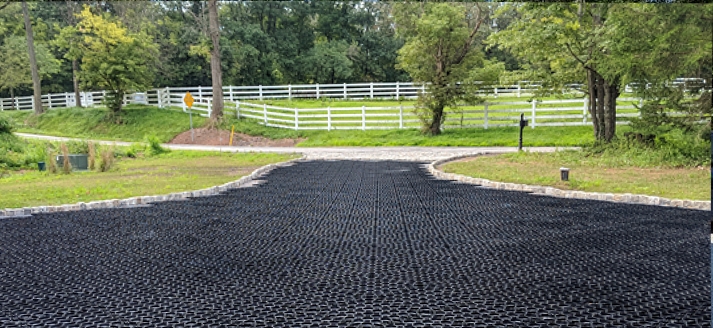
The square, interlocking grids made from 100% recycled plastic are laid over a prepared, compacted subgrade made up of hard, angular gravel. They make for one of, if not the best, alternative driveway surfaces because of their makeup and structure.

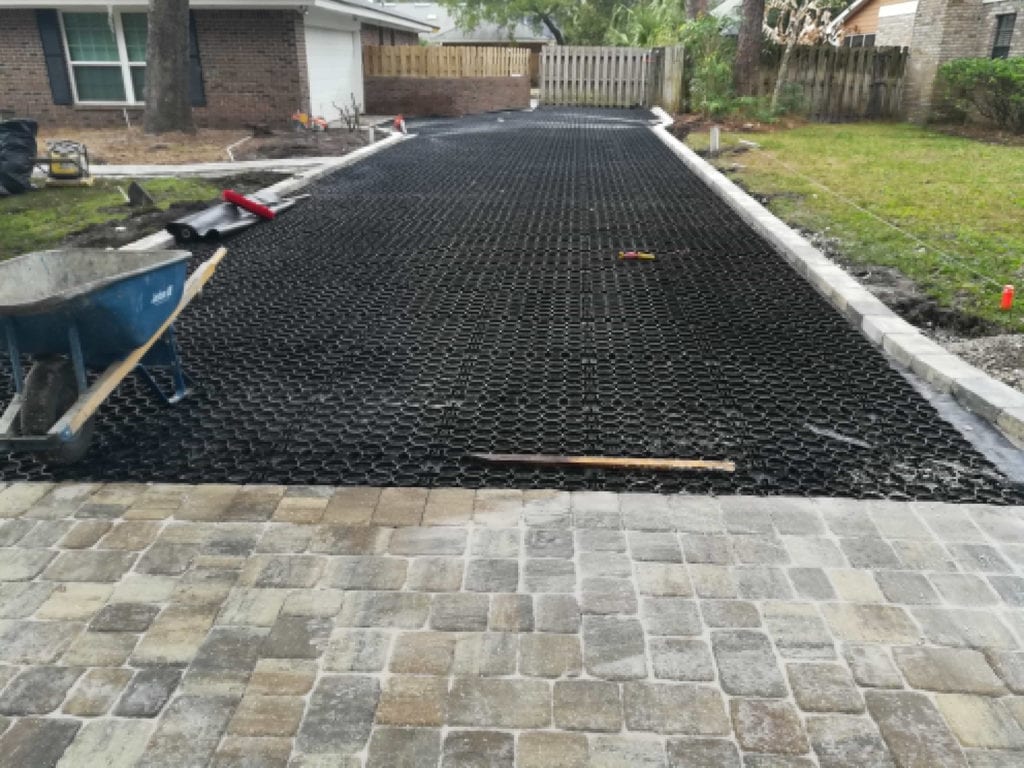
One of the biggest reasons that permeable residential pavers from TRUEGRID make one of the best driveway material alternatives is because they cost very little to install, compared to other concrete driveway alternatives. They are also more durable than concrete, asphalt, and other driveway alternatives due to their patented flex joints. These allow the pavers to absorb and evenly distribute pressure throughout the grid because of the vertical compression strength and flexibility of the joints.
Because of the impervious, solid nature of concrete and asphalt, many people assume these types of driveways are longer-lasting, but this isn’t the case. An alternative asphalt driveway like one built from permeable pavers will last anywhere from 25 to 60 years, depending on how much traffic it gets. This is because the recycled plastic they are made with is high-density polyethylene which has UV inhibitors added for additional protection from the sun.
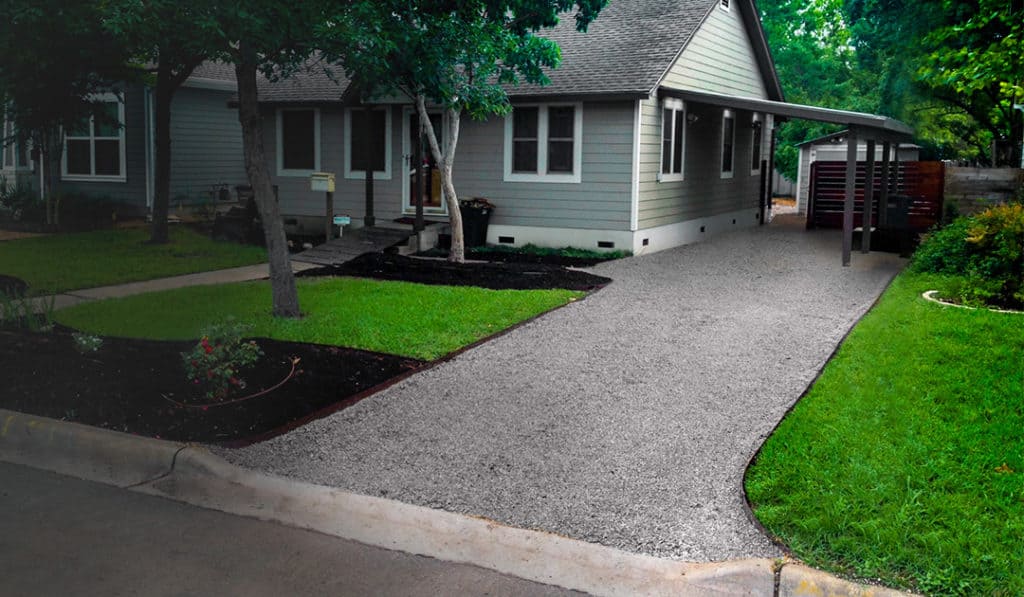
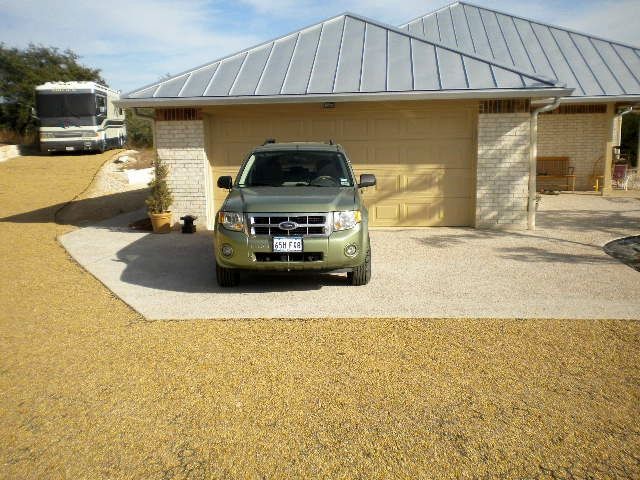
Selecting the Best Driveway Paving Alternative

You have a lot of options when it comes to alternative driveways. Paved driveway alternatives aren’t always cheap and temporary, some alternative driveway solutions are even more durable than concrete or asphalt. Brick is one of the alternatives to a concrete driveway that looks great and won’t cost you much. It can be semi-permeable if laid over sand and comes in many styles.
Loose gravel makes for one of the cheapest driveway alternatives, though it can be high-maintenance when compared to other asphalt driveway alternatives. While it will be able to help with water drainage, ruts and mud holes can still occur if the gravel isn’t regularly reapplied. In terms of alternative driveways, loose gravel is a good option but inferior to other paved driveway alternatives such as TRUEGRID permeable pavers.
Their interlocking plastic pavers are one of the best driveway material alternatives on the market due to their cost-effectiveness, ease-of-installation, and durability. In terms of driveway alternatives to paving, these pavers outperform traditional asphalt and concrete in terms of water-drainage as well as environmental-friendliness.
Looking for alternatives to asphalt driveway can seem like a chore, but going with TRUEGRID permeable pavers can allow you to put all the other driveway alternatives to concrete out of your mind. Their sheer superiority when it comes to permeability, durability, functionality, versatility, and length-of-life make residential pavers from TRUEGRID the number one option to consider when searching for a good alternative to an asphalt driveway.
Browsing through alternatives to paving a driveway doesn’t mean you have to settle for less. Consider using the TRUEGRID permeable paving system and see for yourself why so many homeowners have chosen it instead of other driveway paving alternatives.
option for the base layer of a gravel driveway is item #4. Item #4 is comprised of sand, dirt, and golf ball-sized stones. This type of gravel is available in a few different variations including recycled item # 4, which is made up of recycled stones, brick, blacktop, concrete, and rock.
There is also quarry item # 4, or crushed limestone, gray item # 4 which appears dark grey in color, and crushed bluestone item #4. Crushed bluestone item #4 is usually found in municipal driveways, though.
The middle layer of a gravel driveway features stones closer to golf ball size, with #57 stone being the prominent type of gravel. Otherwise known simply as crushed gravel, #57 stone also helps promote drainage.
5 Types of The Best Surface Gravel for Driveaway
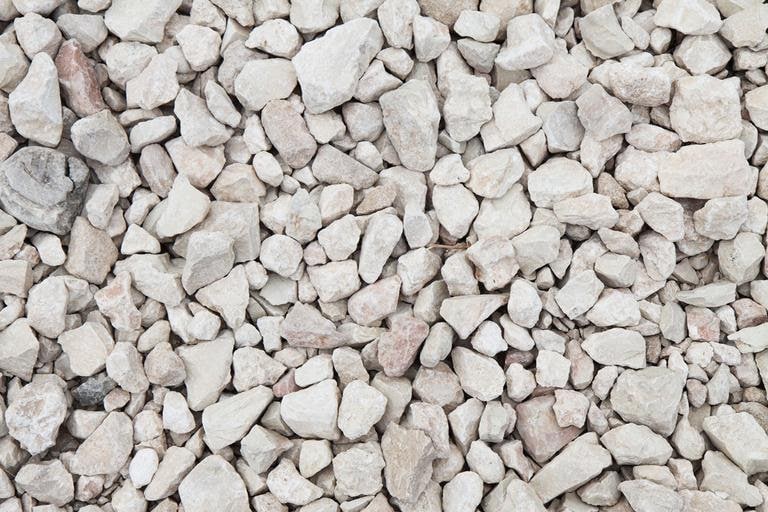
There isn’t a lot of variety for the bottom layers of a gravel driveway, however, there are more options when it comes to finding the best gravel for driveway surfaces. Among the other options are crushed stone #411, quarry process, pea gravel, jersey shore gravel, marble chips, and river rock. These are the best options for driveway surfaces gravel, because they are small stones combined with rock dust, which makes a more solid driving surface.
1. Crushed Stone #411
It is crushed up #57 stone combined with rock dust. This mixture is able to handle moderate traffic from heavy vehicles.
2. Quarry Process
It is also called “crusher run” and works well for the surface of both driveways and walkways. It’s made from stone dust fines and crushed stone.
The stone dust will settle and become compact to create a semisolid surface that is smooth. It is important that you know that this type of surface gravel needs to be sloped towards the sides of your driveway for better drainage.
3. Pea Gravel
Pea gravel is popular gravel for driveway aesthetics. It’s made up of round, small stones that can come in many different colors. This type of gravel will easily migrate and spread under the weight of vehicles, though, and needs to be stabilized for long-term, maintenance-free usage.
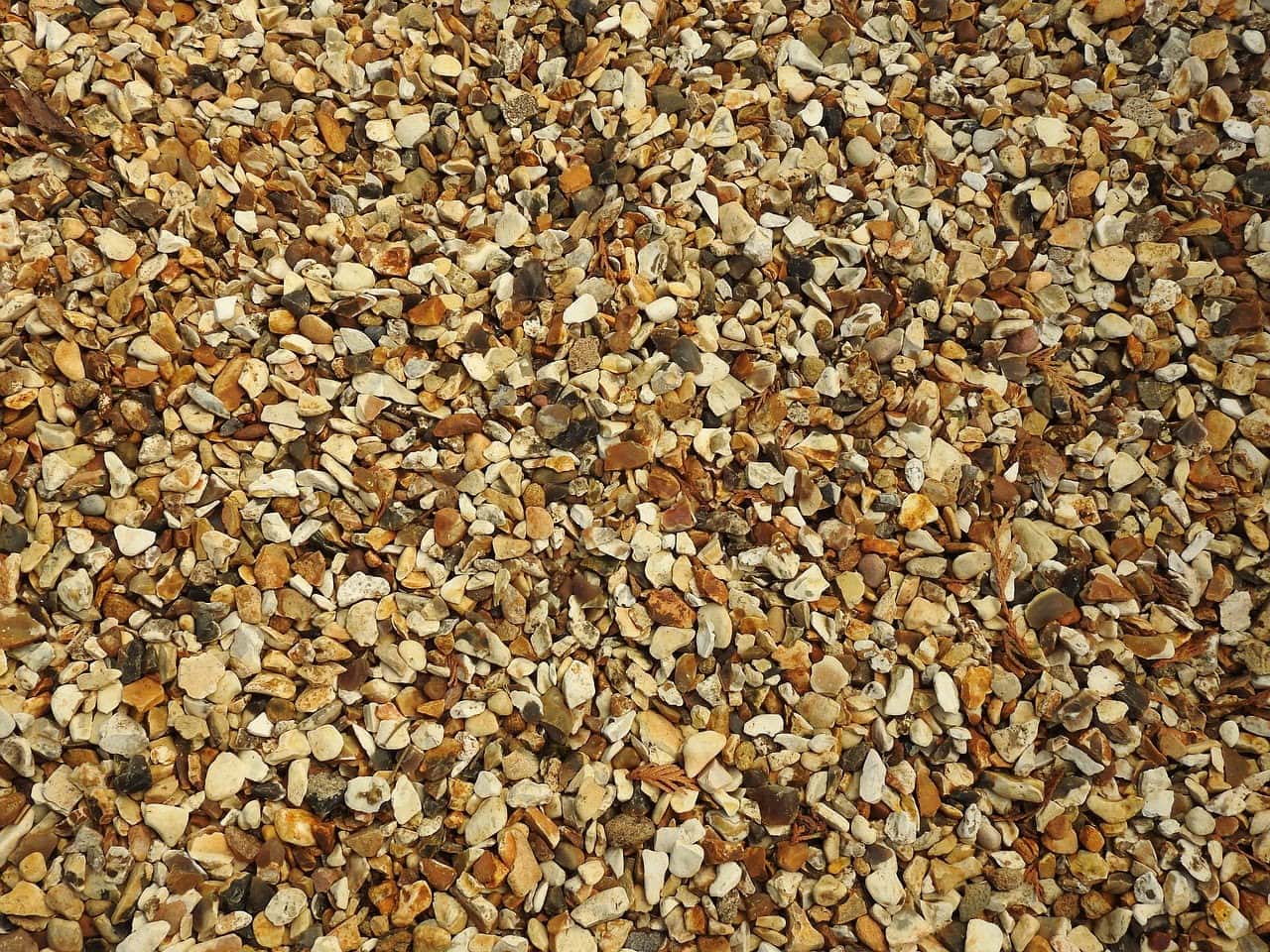
4. Jersey Shore Gravel
It is made of yellow, tan, white, gold, and brownstones and looks quite a bit like sand. It’s similar to pea gravel since it needs borders or stabilizing pavers to prevent it from spreading.
5. Marble Chips
Marble chips are white and they sparkle in the sunlight. They typically cost more than other gravel types but are another favorite when it comes to being the best gravel for driveway aesthetic appeal. This type of gravel also needs a border or stabilization to prevent it from spreading, migrating, and washing away.
6. Blackstar or Blacktrap Rock
A very attractive dark gray gravel, this is an excellent choice as it is angular and locks together. When combined with stabilizing grid paving system, this provides a super durable and beautiful driveway.
A Better Alternative to Typical Gravel Driveways
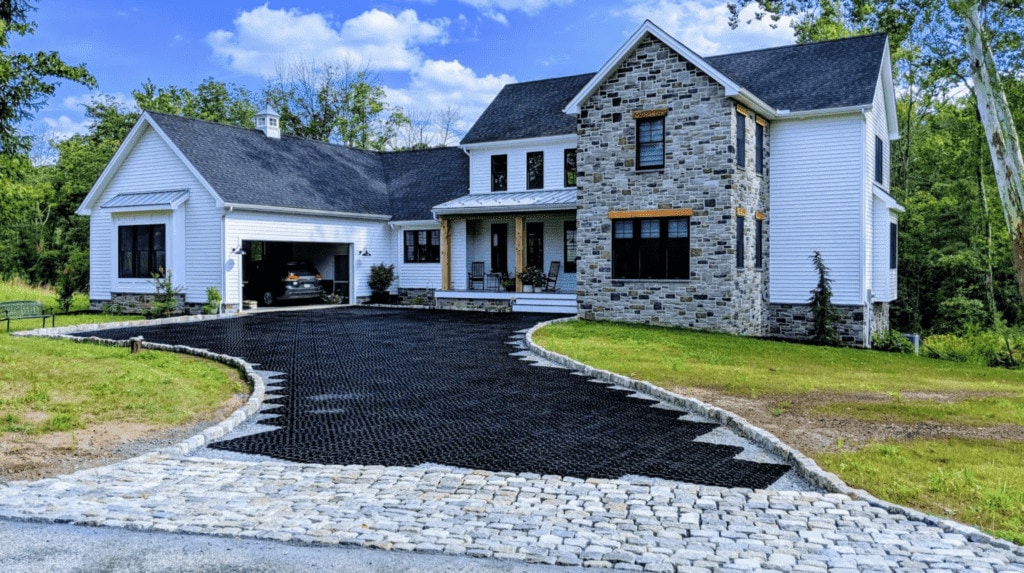
Some of the aforementioned gravel types require stabilization, but the best way to construct any gravel driveway is by using TRUEGRID permeable pavers to lock in your gravel.
TRUEGRID PRO LITE and PRO PLUS stabilizing pavers simply require fill gravel and surface gravel, although you can use the same type of gravel for both. The fill gravel is poured over the top of a piece of fabric at the bottom of the excavated area where you want your driveway that provides drainage for water and other liquids.
It is then compacted and leveled before TRUEGRID permeable pavers are snapped in place over the surface. Next, your surface gravel of choice is poured over the pavers and locked into place using a heavy roller or vehicle. This weighs the pavers down and locks them securely into place.
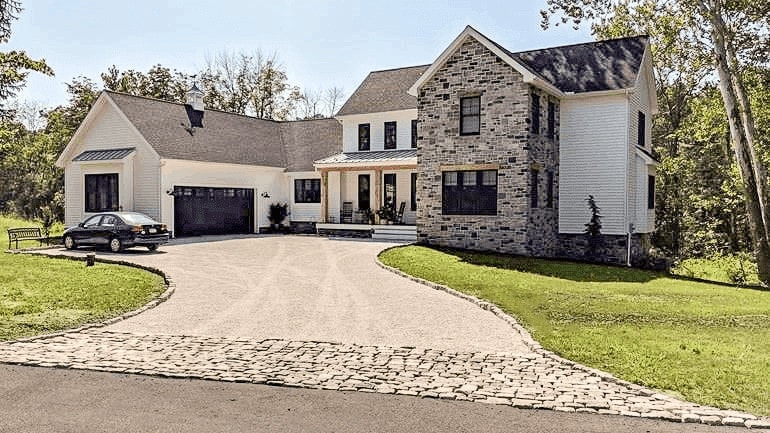
The main benefit of using TRUEGRID pavers to build a gravel driveway is that they will keep your gravel in place, eliminating the need for almost any maintenance during the course of your driveway’s lifetime.
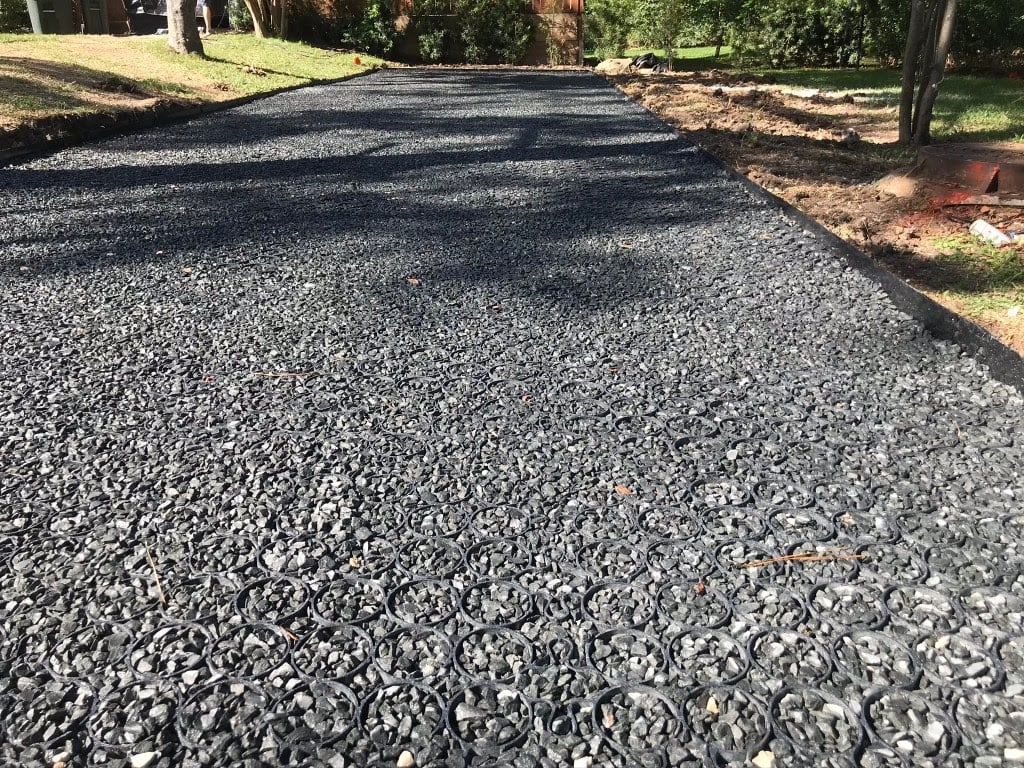
A properly installed and maintained TRUEGRID gravel driveway is durable enough to handle all types of vehicle traffic and will last up to 60 years without cracking or breaking down in the sun, rain, or other types of weather like asphalt does.. Choosing the best gravel for driveway usage is only part of the equation.
If you want to build your gravel driveway the maintenance-free way, get in touch with the pavement professionals at TRUEGRID today for a quote.
The days of automatically paving your commercial parking lots with asphalt are coming to an end. For smart business owners who want to maximize the value of their investments and minimize long-term expenditures wherever possible, asphalt is now in many cases not the best choice. For a multitude of reasons- cost, maintenance, land use, flood protection, environmental concerns, code restrictions-, there are new paving alternatives that are better.
The overall cost, waste, and durability issues with asphalt paving have left room for much more efficient asphalt alternatives to take its place. In case you’re a business owner and you want to implement the most effective alternative to pavement, here’s a breakdown of some of the best you can find.
TRUEGRID Permeable Paving
Permeable paving isn’t exactly a new invention, but TRUEGRID has taken it to the next level. The permeable pavers they offer are one of the best asphalt alternatives for parking lots that you can find.
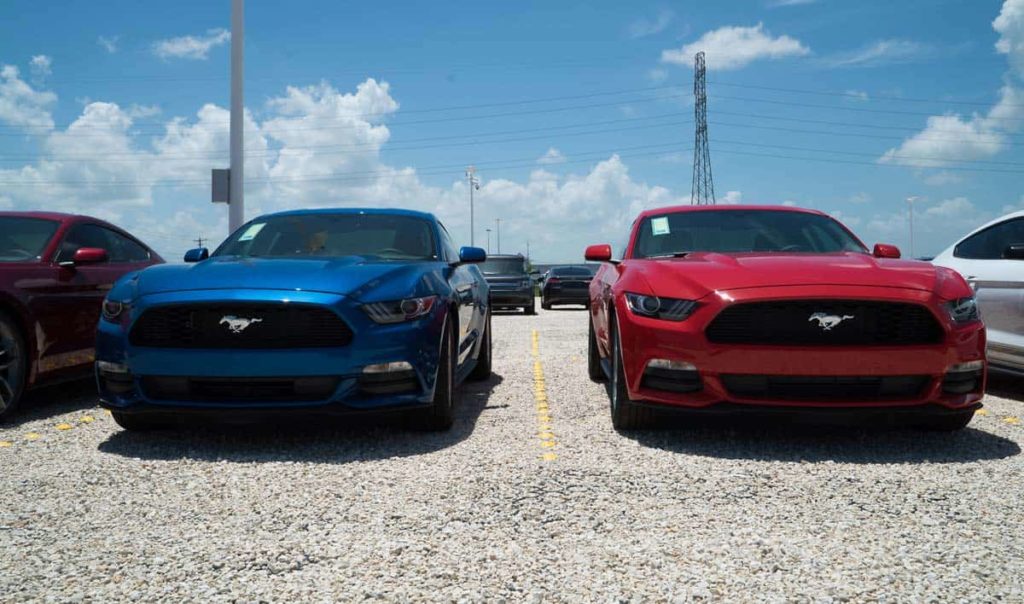
There are numerous ways in which TRUEGRID pavers outperform similar paving alternatives to asphalt. While outperforming asphalt when it comes to drainage, durability, and length-of-life, the commercial permeable pavers offered by TRUEGRID in some applications can be less expensive than the installation and continual repaving of asphalt.
When is TRUEGRID cheaper than asphalt? First, when there is drainage or detention requirements from the use of an impervious material such as asphalt. TRUEGRID is 100 % permeable and can also provide detention under the surface. If a stabilized surface is needed for an undeveloped parking area, sometimes the TRUEGRID PRO LITE can be used without a base. This is the cheapest paving option possible and requires the least amount of site preparation.
In addition to the extremely low cost of installation and maintenance, permeable commercial pavers from TRUEGRID are also 100% permeable. This means unlike other alternatives to asphalt, you’ll never have to deal with mud zones, wash-outs, or puddling.
Even if you have varying permeability needs based on your location and precipitation, the stormwater detention capacity of your commercial TRUEGRID pavers can be adjusted by changing the fill depth and type of substrate used in them. This allows you to easily meet any local code requirements as well as make better use of your land by having a detention or retention structure built right into the sub-base of your pavement.
Commercial Business Require Commercial Paving
While TRUEGRID offers residential paving solutions as well, their commercial pavers are built differently to handle the loads of everyday commercial use. Once filled with gravel, your commercial pavers will be able to handle 1 million lbs per square foot loads of weight at a time. Large, heavy 18 wheelers with full loads are no problem. The weather in your area will have no effect on your pavers’ ability to bear loads, making it the perfect choice for parking lots of all types.
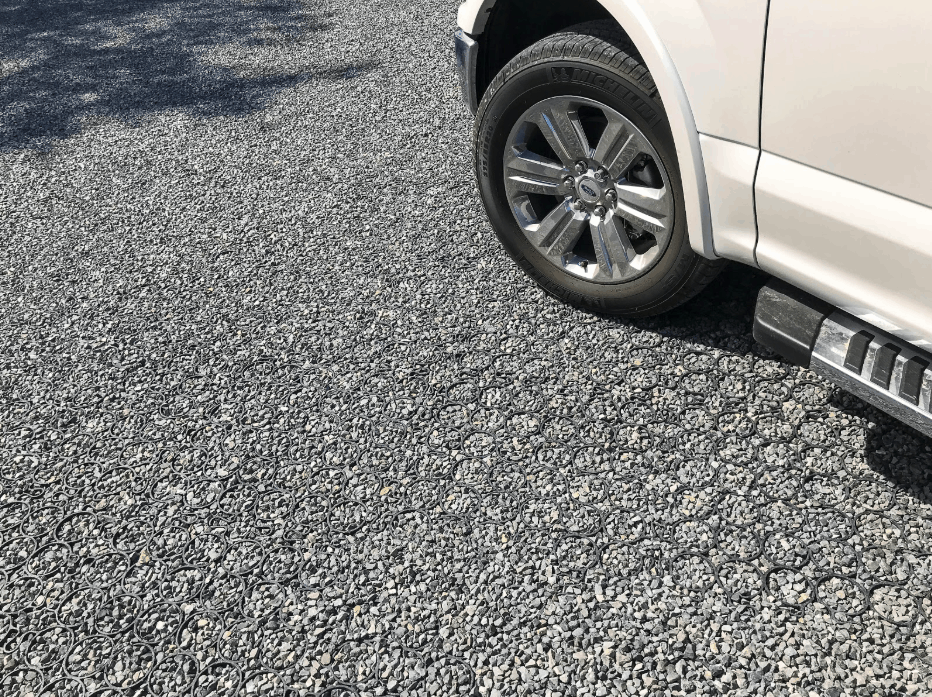
Another great thing about the TRUEGRID paving alternative is that it puts much less strain on the tires of vehicles that drive on it. The friction between gravel-filled permeable pavers and vehicle tires is much less than that of asphalt and tires. Over time, this will translate into a greatly reduced need for vehicle maintenance.
Summertime heat is also no longer an issue for commercial business owners who use TRUEGRID permeable pavers. The average asphalt parking lot will absorb a lot of heat, becoming scorching hot to the touch and even slightly sticky. The heat can cause the asphalt to become soft and get torn up by truck traffic or turning. Commercial pavers from TRUEGRID are made from 100% recycled plastic that can withstand temperatures from -58F to 194 F so the heat has no effect on them whatsoever. Freeze/thaw cycles are also a non-factor for this very reason. The paving system works in all climates and soils.
Alternative paving materials like webbing often fail to prevent the unwanted movement of gravel, but TRUEGRID pavers keep the gravel firmly in place and prevent any rutting from occurring. They also minimize dust. Also, because of the increased amount of traction they create, these commercial pavers are much safer and allow for much less skidding than other alternative paving solutions.
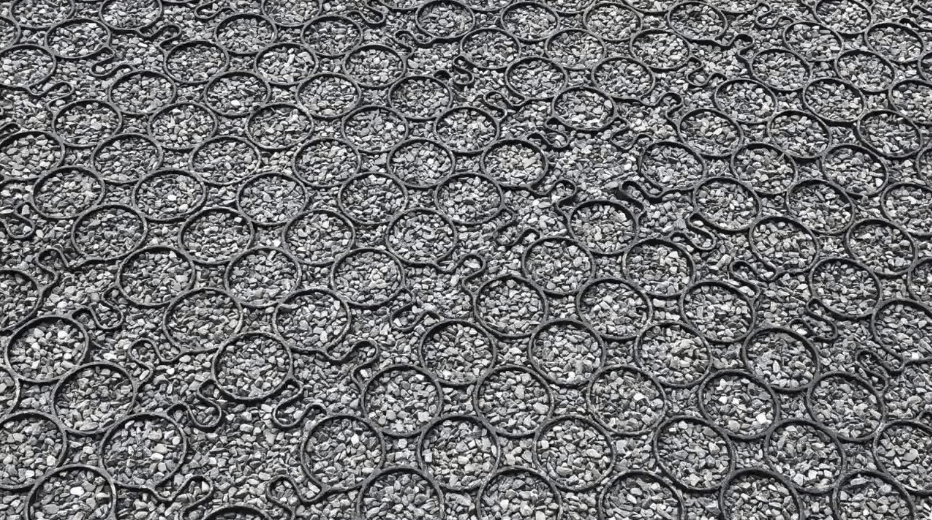
You will never need to repaint lines or restripe your parking lot if you have commercial permeable pavers from TRUEGRID in place. Instead, you’ll have plastic, colored lane markers that lock right into place in the pavers themselves. Not only will these have a life 4 to 5 times painted stripes, they can be repositioned if needed. This is not the case for painted striping used with other alternative paving ideas like porous concrete, for example.
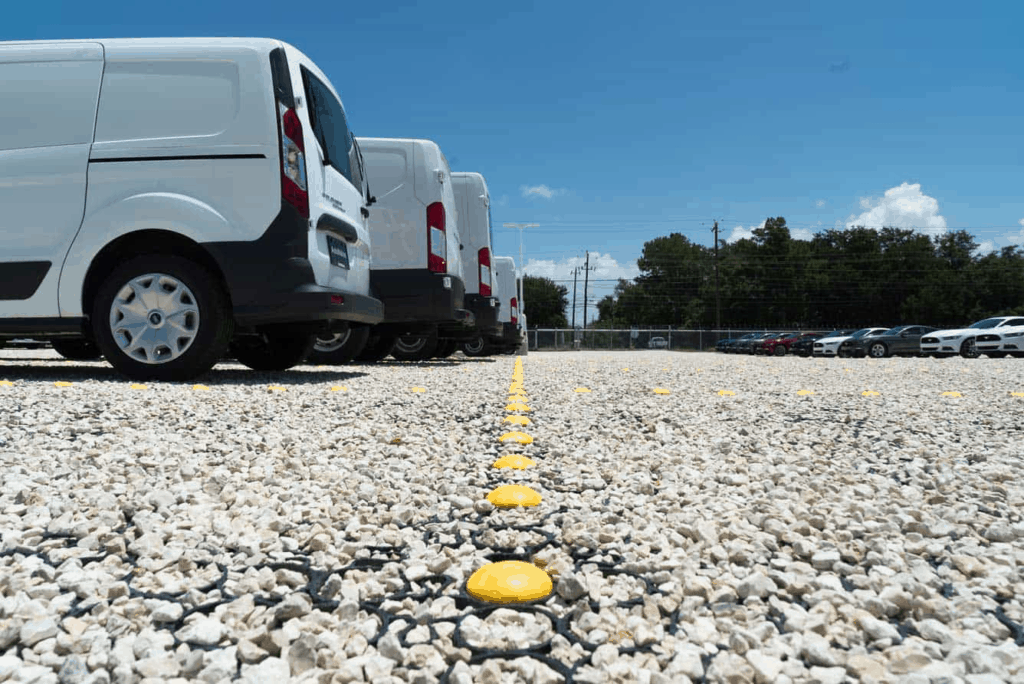
You Don’t Need to Sacrifice Beauty for Performance in Your Parking Lots
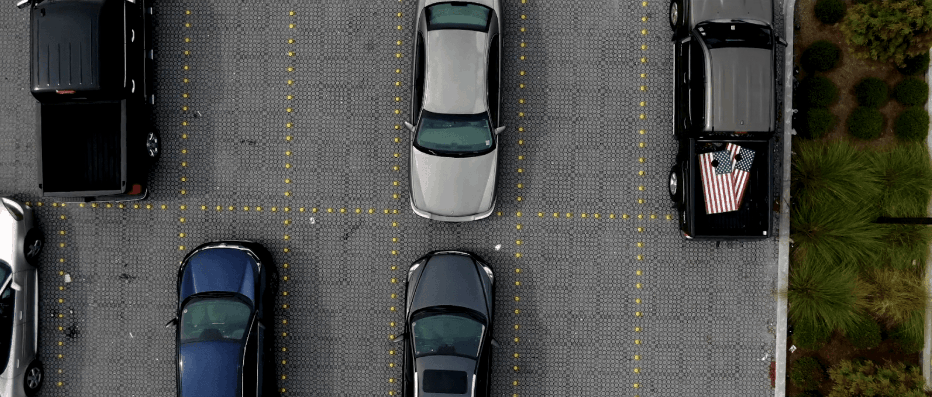
While the permeable commercial pavers from TRUEGRID outperform asphalt as well as other pavement alternatives on a functional level, they don’t leave a lot to be desired in the way of aesthetic beauty either. A well-laid permeable paver parking lot will look just as, if not more, beautiful than an asphalt parking lot.
If you’re looking for alternatives to paving that can lower your overall costs in the short-term as well as long-term, look no further than permeable commercial pavers from TRUEGRID. This type of parking lot will last anywhere from 25 to 60 years, and never needs to be repainted or repaved. It provides a natural outlet for water drainage, does less damage to vehicles, is more environmentally-friendly, and more cost-effective as well.
It might sound like an exaggeration to say that asphalt is being phased out of use, but when you add up all the benefits of permeable pavers like those offered by TRUEGRID, it’s not hard to see why more and more commercial business owners are making the switch every day.

